 Petzlover
Petzlover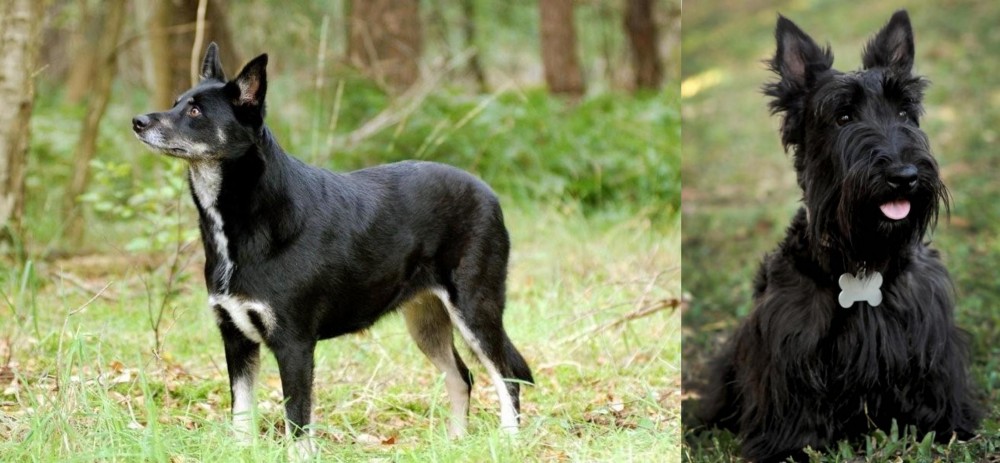 Lapponian Herder is originated from Finland but Scoland Terrier is originated from United Kingdom. Lapponian Herder may grow 24 cm / 10 inches higher than Scoland Terrier. Lapponian Herder may weigh 25 kg / 56 pounds more than Scoland Terrier. Both Lapponian Herder and Scoland Terrier has almost same life span. Both Lapponian Herder and Scoland Terrier has same litter size. Lapponian Herder requires Moderate Maintenance. But Scoland Terrier requires High Maintenance
Lapponian Herder is originated from Finland but Scoland Terrier is originated from United Kingdom. Lapponian Herder may grow 24 cm / 10 inches higher than Scoland Terrier. Lapponian Herder may weigh 25 kg / 56 pounds more than Scoland Terrier. Both Lapponian Herder and Scoland Terrier has almost same life span. Both Lapponian Herder and Scoland Terrier has same litter size. Lapponian Herder requires Moderate Maintenance. But Scoland Terrier requires High Maintenance
 The Lapponian Herder hails from Finland. He is a dog which was developed for the Sami people who needed a strong dog to herd and guard their reindeer. The Sami people knew that they could reply on these Spitz-type dogs to efficiently manage their reindeer herds.
The Lapponian Herder hails from Finland. He is a dog which was developed for the Sami people who needed a strong dog to herd and guard their reindeer. The Sami people knew that they could reply on these Spitz-type dogs to efficiently manage their reindeer herds.
As with many other dog breeds, their numbers dwindled during and after the Second World War, and breeders then stepped forward to restore the herding dog populations. The dog was developed from Spitz-type herding breeds which were crossed with black and white Karelian Bear Dogs as well as other dog varieties.
Both the Lapponian Herder and the Finnish Lapphund were recognized as the same breed, with the Lapponian being separated into its own breed in 1966.
The dog is one of Finland’s five national dog breeds and in 2017, the Lapponian Herder was accepted to the Foundation Stock Service program.
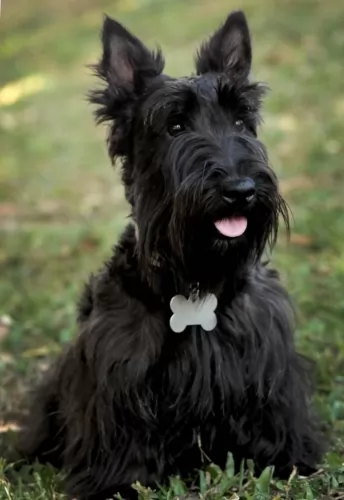 Not much is known about the Scoland Terrier. It is not a purebred but rather a crossbreed developed by crossing the Scottish Terrier with the Westland Terrier. To understand these mixed breeds, look to the original breeds for any combination of the characteristics of the breeds. The offspring of this crossing is not a 50-50 split of the original breeds looks or temperament.
Not much is known about the Scoland Terrier. It is not a purebred but rather a crossbreed developed by crossing the Scottish Terrier with the Westland Terrier. To understand these mixed breeds, look to the original breeds for any combination of the characteristics of the breeds. The offspring of this crossing is not a 50-50 split of the original breeds looks or temperament.
Because the Scoland Terrier is a mix between the Scottie and the Westie he has all the characteristics of a typical terrier perhaps even twice as much. With both parents being terriers, you can expect your Scoland to act like a short legged terrier. These dogs are known for their courage and tenacity. Today these terriers are family companions. Most terriers today come from a pool of ancestral dog in the 19th century in Europe. This information was gleaned from a genetic analysis done in 2006.
The Scoland Terrier, being a hybrid, is not acknowledged by the American Kennel Club (AKC) or the United Kennel Club (UKC). It is acknowledged by the International Designer Canine Registry (IDCR), American Canine Hybrid Club (ACHC), Dog Registry of America, Inc. (DRA), Designer Dogs Kennel Club (DDKC) and Designer Breed Registry (DBR).
 This is a medium sized dog and both male and female dogs stand between 43 and 51cm in height and weigh in the region of 30 to 35kg.
This is a medium sized dog and both male and female dogs stand between 43 and 51cm in height and weigh in the region of 30 to 35kg.
They have a medium length double coat which is straight and fairly harsh to the touch. They are moderate shedders.
Looking much like a combination German Shepherd and Wolf, the Lapponian Herder’s coat can be dark grey, cream, dark brown and black. He has erect ears, brown eyes and a long bushy tail which can be held low but which he raises somewhat over the back when he is alert. The head is wedge-shaped with tapering muzzle and black nose.
Energetic and lively while also being calm, the Lapponian Herder makes an excellent family pet.
As a very active breed, he is going to need an active, outdoor-type of owner. He is an intelligent, independent dog who wants to be kept busy. Because of his smartness he is easy to train ad socialize, being a dog that wants to please.
Training and socialization will do wonders for him, particularly because he is a vocal dog, loving to bark and air his views. With the training you can call out to him ‘be quiet’ and he will, as he becomes an obedient dog who is a pleasure to have around in all kinds of situations.
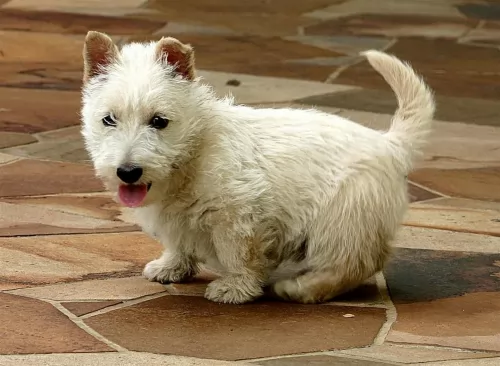 Being a hybrid, the Scoland Terrier will not always look alike and could look like a Scottie, a Westie or a combination of the two. Most breeders of this designer dog say it usually has a body like the Scottie and a round head like the Westie. They are more often black with white markings, but they can often be wheaten as well. With round dark eyes, a scissors bite and black nose, her face is unique. The breed has erect and small, triangular ears and a medium fluffy tale. The coat is hard and wiry, with a dense soft undercoat.
Being a hybrid, the Scoland Terrier will not always look alike and could look like a Scottie, a Westie or a combination of the two. Most breeders of this designer dog say it usually has a body like the Scottie and a round head like the Westie. They are more often black with white markings, but they can often be wheaten as well. With round dark eyes, a scissors bite and black nose, her face is unique. The breed has erect and small, triangular ears and a medium fluffy tale. The coat is hard and wiry, with a dense soft undercoat.
 The Lapponian Herder is a great family pet who is social and who loves being in the company of his human family, being able to get on well with children in the home too, as well as pets.
The Lapponian Herder is a great family pet who is social and who loves being in the company of his human family, being able to get on well with children in the home too, as well as pets.
He plays a protective role too, not being quiet when it comes to barking and warning his family of intruders.
They’re very energetic dogs but can be docile indoors. He is smart too, being able to learn quickly. Bring one of these Lapponian Herders into your home, and you’re guaranteed a splendid family pet.
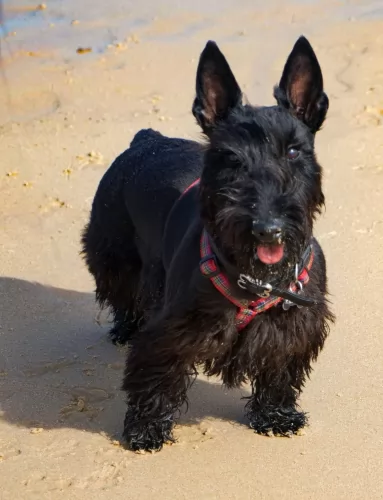 1.Children friendliness - they can be very good with children and children can help them get their exercise.
1.Children friendliness - they can be very good with children and children can help them get their exercise.
3.Adaptability - yes but she is adept at digging and must have a safe enclosure.
 The Lapponian Herder, with good care, should be able to live for 10 to 14 years.
The Lapponian Herder, with good care, should be able to live for 10 to 14 years.
He is generally believed to be a healthy dog breed, but as with most other dogs, there are a few health issues which can crop up. These can be eye- and infections as well as skin allergies. These can be highly irritating for your dog and painful too, and veterinary intervention may be required.
Other serious dog problems can be bloat and joint dysplasia.
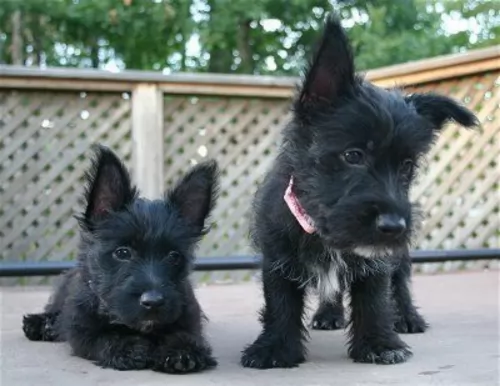 This hybrid dog can inherit any of the issues faced by its two parent breeds. For the Scoland Terrier this can include:
This hybrid dog can inherit any of the issues faced by its two parent breeds. For the Scoland Terrier this can include:
• Seborrhea – Skin disease that can cause dogs to scratch until bleeding and/or infected.
• Carniomandibular Osteopathy -called lion’s jaw this is a developmental disease that causes extensive changes in the bones of the mandible and skull.
• Pulmonic Stenosis – when the blood flowing from the heart’s right ventricul to the pulmonary artery is blocked.
• PPM or Persistent Pupillary Membranes - causes visual impairment when the membranes do not dissolve after birth.
• Chronic Hepatitis – disease of the liver that can eventually cause major damage.
 The Lapponian Herder has a dense coat and he is considered to be an average shedder with some seasonal shedding.
The Lapponian Herder has a dense coat and he is considered to be an average shedder with some seasonal shedding.
To keep the coat sleek and shiny, get into the habit of brushing him twice a week. With the assistance of the right grooming tools you will be able to clip his nails if he doesn’t wear them down naturally. Just be careful though, because cutting to far down can mean cutting him where the nerves are and this can cause your pet great pain.
When you brush him, check his ears at the same time and use a damp cloth to wipe away the excess wax and dirt.
His teeth should also be cleaned with canine toothpaste and toothbrush. If you are apprehensive about keeping up with these grooming procedures, there are professional dog grooming experts who will attend to your dog’s grooming needs.
The Lapponian Herder is a medium sized dog full of energy.
If you feed him commercially manufactured kibble, you’ll read on the packaging about the type of food it is and what portion sizes to give him. Always go for the top quality brands that are made with good meaty ingredients and not filled with the likes of colorants and preservatives.
It is healthier to give him 2 smaller meals a day as opposed to one large meal. Try and give him some home-cooked food to bring in some variety. Excellent food for him would be some cooked chicken, brown rice, pasta and some cooked or raw vegetables added into his kibble. Every now and then it can be good for him to have a bit of raw meat added into his food.
Your Lapponian Herder must have constant access to cool, fresh water. Remember to wash the bowl out regularly, as the dog’s saliva enters the water when drinking.
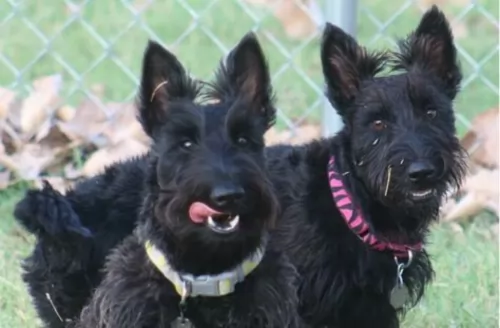 1.Feeding the puppy - Give a high quality puppy dog food designed for terriers or active medium sized dogs. Give ¾ of a cup over 3 meals a day.
1.Feeding the puppy - Give a high quality puppy dog food designed for terriers or active medium sized dogs. Give ¾ of a cup over 3 meals a day.
2.Feeding the adult – Give a high quality adult dog food designed for terriers or active medium sized dogs. Give one cup over two meals a day.
4. Games and Exercises – The Scoland Terrier is a very active dog and needs daily exercise, He need time to play, run, and be stimulated by games. She would be very good at flyball, Frisbee, fetch, agility, barn hunt, and obedience. He needs at least 2 hours of play and exercise everyday.